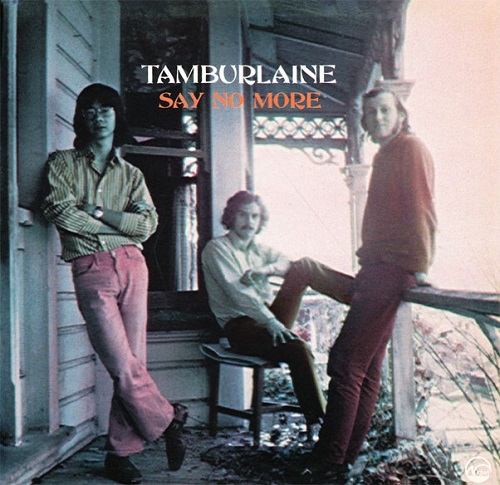الوصف:
(2018 ) Tamburlaine - Say No More (1972, Reissue)
Review:
Internationally and at home in the 1970s, the softer sounds of folk rock and melodic prog swept the airwaves. Singer-songwriters gaining exposure included Shona Laing, John Hanlon, and groups Waves from Auckland, Serenity in Christchurch and Lutha in Dunedin. In the middle of it all was Tamburlaine. Raised in Wellington’s rich musical underground, the great Tamburlaine was born from British-style blues and the folk revival, and graduated from shouty, sweaty clubs to spellbinding larger concerts. Guitarist Steve Robinson grew up in Fiji, where he studied piano from age four, played the violin in school orchestras and learned the ukulele, which naturally led to guitar. Returning with his family to New Zealand as a young teenager he first played bass in Christ College’s ironically named beat covers band The Pagans, and later, lead guitar with Wellington College’s Us Five. Long before graduating to guitar, young Denis Leong studied piano for eight excruciating years, while also developing his singing voice. Backed by brother Kevin on guitar, Leong sang and together the brothers dominated 1950s talent shows, where they regularly won prizes in competition and accumulated a modest collection of toasters and other small kitchen appliances. “I would like to say we sang early Chuck Berry or Everly Brothers tunes,” says Denis Leong, “but … our repertoire was limited to all but the cheesiest of top twenty hits.” Meanwhile, bassist Simon Morris was playing lead guitar in his Onslow College school band Changing Times when formidable future vocalist Rick Bryant tried out for singer, but was turned down. Meeting up again with Morris at university, a newly honed Bryant fancied starting a “serious blues band”, and he and Morris bore Original Sin. “Original Sin was very much a bunch of mates into Chicago type blues (Howlin’ Wolf, Muddy Waters, etc.), pretty much driven by Rick,” says Steve Robinson. After unshackling from Rick’s harmonically-challenged brother Rod on mouth harp, the Sin really caught fire when ex-Canberran draft-dodger Bill Lake took on guitar and harmonica. Cafe L’Affare founder Jeff Kennedy played drums, rounded off, says Morris, with “a revolving door of bass-players. We could never hold onto one. Steve Robinson was one, Tony Backhouse another, [and] Lindsay Field [later an in-demand backing vocalist in Australia].” “I went to see Original Sin perform in a school gym,” says Denis Leong. “The stage was full but the hall was empty and there was possibly just one functional amplifier. I was there because Rodney Bryant – a year younger at Rongotai College – claimed to play in a rock band. A group of fellow sixth-form skeptics went to check this out. While Rodney did not play, his older brother Rick did, ably fashioning a credible Chicago blues frontman persona in the manner of a prematurely weathered Van Morrison. More striking was another fellow who did all the talking bits between songs. This fellow told great jokes and projected a very sunny entertaining disposition … a touch at odds with the otherwise grim authentic blues ethos. That was Simon.” Sure, Original Sin had started off playing “authentic” blues – via the Stones and The Pretty Things – but soon the Sin stepped even farther from the source when Hendrix and Cream modified the mix. Songs got longer, tempos and keys changed more, and there was more adlibbing and improvisation. They played sporadically – including a gig for the Karori Girl Guides – and by 1968 they were the resident band at the Mystic, on Wellington’s Willis Street, a hot, smoky blues club with ultraviolet lighting. Perhaps as penance for the volume and excess of Original Sin, Morris joined a jug band with fellow student Lindy Mason – the Kelburn International Airport Ceremonial Guard Band – which also featured her boyfriend and ex-bassist Steve Robinson, with Mitch Park, Mike Rashbrooke on the jug, and future Windy City Strugglers Bill Lake and Geoff Rashbrooke. Mason introduced the KIACGB to West Coast American bands Jefferson Airplane and Buffalo Springfield, and the group started to introduce techniques which would become Tamburlaine standard practice: rich vocal harmonies and multi-instrumentalism. Morris took on traditional – if somewhat silly – folk instruments like tin whistle, ukulele and kazoo, with Robinson on guitar and high harmonies. The group played the Christchurch Arts Festival in August 1967.

Tracklist:
01. Pass A Piece Of Paper
02. Lady Wakes Up
03. The Raven And The Nightingale
04. Do For The Others
05. Saffron Lady
06. Some Other Day
07. Rainy City Memoirs
08. The Flame Of Thoriman
Media Report:
Genre: folk-rock, prog-rock
Format: FLAC
Format/Info: Free Lossless Audio Codec, 16-bit PCM
Bit rate mode: Variable
Channel(s): 2 channels
Sampling rate: 44.1 KHz
Bit depth: 16 bits |